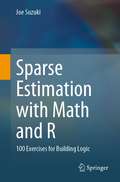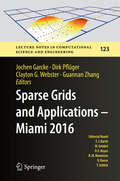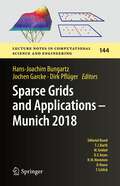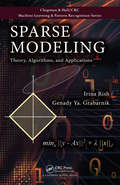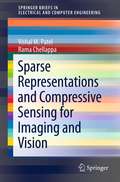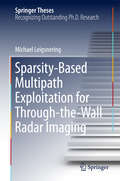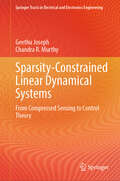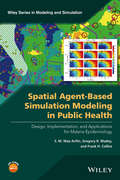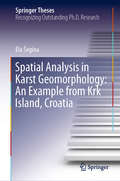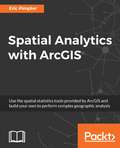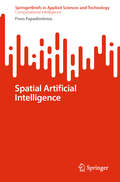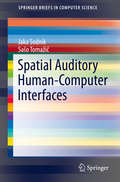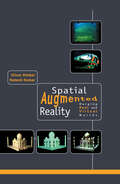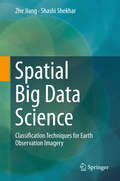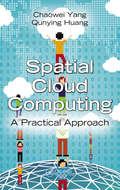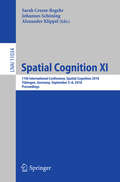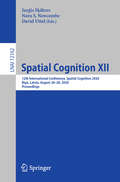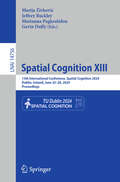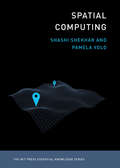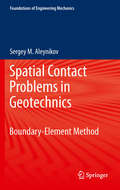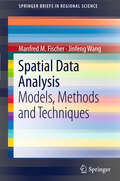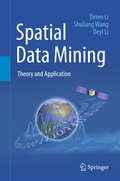- Table View
- List View
Sparse Estimation with Math and R: 100 Exercises for Building Logic
by Joe SuzukiThe most crucial ability for machine learning and data science is mathematical logic for grasping their essence rather than knowledge and experience. This textbook approaches the essence of sparse estimation by considering math problems and building R programs. Each chapter introduces the notion of sparsity and provides procedures followed by mathematical derivations and source programs with examples of execution. To maximize readers’ insights into sparsity, mathematical proofs are presented for almost all propositions, and programs are described without depending on any packages. The book is carefully organized to provide the solutions to the exercises in each chapter so that readers can solve the total of 100 exercises by simply following the contents of each chapter.This textbook is suitable for an undergraduate or graduate course consisting of about 15 lectures (90 mins each). Written in an easy-to-follow and self-contained style, this book will also be perfect material for independent learning by data scientists, machine learning engineers, and researchers interested in linear regression, generalized linear lasso, group lasso, fused lasso, graphical models, matrix decomposition, and multivariate analysis.This book is one of a series of textbooks in machine learning by the same author. Other titles are: - Statistical Learning with Math and R (https://www.springer.com/gp/book/9789811575679) - Statistical Learning with Math and Python (https://www.springer.com/gp/book/9789811578762) - Sparse Estimation with Math and Python
Sparse Grids and Applications - Miami 2016 (Lecture Notes in Computational Science and Engineering #123)
by Dirk Pflüger Jochen Garcke Clayton G. Webster Guannan ZhangSparse grids are a popular tool for the numerical treatment of high-dimensional problems. Where classical numerical discretization schemes fail in more than three or four dimensions, sparse grids, in their different flavors, are frequently the method of choice. This volume of LNCSE presents selected papers from the proceedings of the fourth workshop on sparse grids and applications, and demonstrates once again the importance of this numerical discretization scheme. The articles present recent advances in the numerical analysis of sparse grids in connection with a range of applications including computational chemistry, computational fluid dynamics, and big data analytics, to name but a few.
Sparse Grids and Applications - Munich 2018 (Lecture Notes in Computational Science and Engineering #144)
by Hans-Joachim Bungartz Dirk Pflüger Jochen GarckeSparse grids are a popular tool for the numerical treatment of high-dimensional problems. Where classical numerical discretization schemes fail in more than three or four dimensions, sparse grids, in their different flavors, are frequently the method of choice.This volume of LNCSE presents selected papers from the proceedings of the fifth workshop on sparse grids and applications, and demonstrates once again the importance of this numerical discretization scheme. The articles present recent advances in the numerical analysis of sparse grids in connection with a range of applications including uncertainty quantification, plasma physics simulations, and computational chemistry, to name but a few.
Sparse Image and Signal Processing
by Jean-Luc Starck Fionn Murtagh Jalal FadiliThis book presents the state of the art in sparse and multiscale image and signal processing, covering linear multiscale transforms, such as wavelet, ridgelet, or curvelet transforms, and non-linear multiscale transforms based on the median and mathematical morphology operators. Recent concepts of sparsity and morphological diversity are described and exploited for various problems such as denoising, inverse problem regularization, sparse signal decomposition, blind source separation, and compressed sensing. This book weds theory and practice in examining applications in areas such as astronomy, biology, physics, digital media, and forensics. A final chapter explores a paradigm shift in signal processing, showing that previous limits to information sampling and extraction can be overcome in very significant ways. Matlab and IDL code accompany these methods and applications to reproduce the experiments and illustrate the reasoning and methodology of the research are available for download at the associated web site.
Sparse Image and Signal Processing: Wavelets, Curvelets, Morphological Diversity
by Jean-Luc Starck Fionn Murtagh Jalal M. FadiliThis book presents the state of the art in sparse and multiscale image and signal processing, covering linear multiscale transforms, such as wavelet, ridgelet, or curvelet transforms, and non-linear multiscale transforms based on the median and mathematical morphology operators. Recent concepts of sparsity and morphological diversity are described and exploited for various problems such as denoising, inverse problem regularization, sparse signal decomposition, blind source separation, and compressed sensing. This book weds theory and practice in examining applications in areas such as astronomy, biology, physics, digital media, and forensics. A final chapter explores a paradigm shift in signal processing, showing that previous limits to information sampling and extraction can be overcome in very significant ways. Matlab and IDL code accompany these methods and applications to reproduce the experiments and illustrate the reasoning and methodology of the research available for download at the associated Web site.
Sparse Modeling: Theory, Algorithms, and Applications (Chapman & Hall/CRC Machine Learning & Pattern Recognition)
by Irina Rish Genady GrabarnikSparse models are particularly useful in scientific applications, such as biomarker discovery in genetic or neuroimaging data, where the interpretability of a predictive model is essential. Sparsity can also dramatically improve the cost efficiency of signal processing.Sparse Modeling: Theory, Algorithms, and Applications provides an introduction t
Sparse Representation, Modeling and Learning in Visual Recognition
by Hong ChengThis unique text/reference presents a comprehensive review of the state of the art in sparse representations, modeling and learning. The book examines both the theoretical foundations and details of algorithm implementation, highlighting the practical application of compressed sensing research in visual recognition and computer vision. Topics and features: describes sparse recovery approaches, robust and efficient sparse representation, and large-scale visual recognition; covers feature representation and learning, sparsity induced similarity, and sparse representation and learning-based classifiers; discusses low-rank matrix approximation, graphical models in compressed sensing, collaborative representation-based classification, and high-dimensional nonlinear learning; includes appendices outlining additional computer programming resources, and explaining the essential mathematics required to understand the book.
Sparse Representations and Compressive Sensing for Imaging and Vision
by Vishal M. Patel Rama ChellappaCompressed sensing or compressive sensing is a new concept in signal processing where one measures a small number of non-adaptive linear combinations of the signal. These measurements are usually much smaller than the number of samples that define the signal. From these small numbers of measurements, the signal is then reconstructed by non-linear procedure. Compressed sensing has recently emerged as a powerful tool for efficiently processing data in non-traditional ways. In this book, we highlight some of the key mathematical insights underlying sparse representation and compressed sensing and illustrate the role of these theories in classical vision, imaging and biometrics problems.
Sparsity-Based Multipath Exploitation for Through-the-Wall Radar Imaging
by Michael LeigsneringThis thesis reports on sparsity-based multipath exploitation methods for through-the-wall radar imaging. Multipath creates ambiguities in the measurements provoking unwanted ghost targets in the image. This book describes sparse reconstruction methods that are not only suppressing the ghost targets, but using multipath to one’s advantage. With adopting the compressive sensing principle, fewer measurements are required for image reconstruction as compared to conventional techniques. The book describes the development of a comprehensive signal model and some associated reconstruction methods that can deal with many relevant scenarios, such as clutter from building structures, secondary reflections from interior walls, as well as stationary and moving targets, in urban radar imaging. The described methods are evaluated here using simulated as well as measured data from semi-controlled laboratory experiments.
Sparsity-Constrained Linear Dynamical Systems: From Compressed Sensing to Control Theory (Springer Tracts in Electrical and Electronics Engineering)
by Geethu Joseph Chandra R. MurthyThis volume provides a comprehensive overview of recent research advances in the upcoming field of sparse control and state estimation of linear dynamical systems. The contents offer a detailed introduction to the subject by combining classical control theory and compressed sensing. It covers conceptual foundations, including the formulation, theory, and algorithms, and outlines numerous remaining research challenges. Specifically, the book provides a detailed discussion on observability, controllability, and stabilizability under sparsity constraints. It also presents efficient, systematic, and rigorous approaches to estimating the sparse initial states and designing sparse control inputs. It also gives background materials from real analysis and probability theory and includes applications in network control, wireless communication, and image processing. It serves as a compendious source for graduate students and researchers in signal processing and control systems to acquire a thorough understanding of the underlying unified themes. The academic and industrial professionals working on the design and optimization of sparsity-constrained systems also benefit from the exposure to the array of recent works on linear dynamical systems and related mathematical machinery.
Spatial Agent-Based Simulation Modeling in Public Health: Design, Implementation, and Applications for Malaria Epidemiology
by S. M. Niaz Arifin Gregory R. Madey Frank H. CollinsPresents an overview of the complex biological systems used within a global public health setting and features a focus on malaria analysis Bridging the gap between agent-based modeling and simulation (ABMS) and geographic information systems (GIS), Spatial Agent-Based Simulation Modeling in Public Health: Design, Implementation, and Applications for Malaria Epidemiology provides a useful introduction to the development of agent-based models (ABMs) by following a conceptual and biological core model of Anopheles gambiae for malaria epidemiology. Using spatial ABMs, the book includes mosquito (vector) control interventions and GIS as two example applications of ABMs, as well as a brief description of epidemiology modeling. In addition, the authors discuss how to most effectively integrate spatial ABMs with a GIS. The book concludes with a combination of knowledge from entomological, epidemiological, simulation-based, and geo-spatial domains in order to identify and analyze relationships between various transmission variables of the disease. Spatial Agent-Based Simulation Modeling in Public Health: Design, Implementation, and Applications for Malaria Epidemiology also features: Location-specific mosquito abundance maps that play an important role in malaria control activities by guiding future resource allocation for malaria control and identifying hotspots for further investigation Discussions on the best modeling practices in an effort to achieve improved efficacy, cost-effectiveness, ecological soundness, and sustainability of vector control for malaria An overview of the various ABMs, GIS, and spatial statistical methods used in entomological and epidemiological studies, as well as the model malaria study A companion website with computer source code and flowcharts of the spatial ABM and a landscape generator tool that can simulate landscapes with varying spatial heterogeneity of different types of resources including aquatic habitats and houses Spatial Agent-Based Simulation Modeling in Public Health: Design, Implementation, and Applications for Malaria Epidemiology is an excellent reference for professionals such as modeling and simulation experts, GIS experts, spatial analysts, mathematicians, statisticians, epidemiologists, health policy makers, as well as researchers and scientists who use, manage, or analyze infectious disease data and/or infectious disease-related projects. The book is also ideal for graduate-level courses in modeling and simulation, bioinformatics, biostatistics, public health and policy, and epidemiology.
Spatial Analysis in Karst Geomorphology: An Example from Krk Island, Croatia (Springer Theses)
by Ela ŠeginaThis book presents (i) a comprehensive methodological approach in analyzing karst surface features using contemporary GIS tools of high resolution applied on a large study area and extensive dataset, (ii) a revision and evaluation of the existing concepts valid in the modern karst geomorphology, (iii) a detailed elaboration of overlooked and yet undefined karst surface features, and (iv) an innovation in the discussion on origin and evolution of karst surface features. The book contains the first example of such comprehensive application of the modern technologies in spatial analysis in the field of karst geomorphology, and it offers several new methodological and theoretical perspectives and presents numerous starting points for further research. It contributes both to the understanding of the local karst evolution and to the knowledge of karst surface features globally.
Spatial Analytics with ArcGIS
by Eric PimplerPattern Analysis and cluster mapping made easy About This Book • Analyze patterns, clusters, and spatial relationships using ArcGIS tools • Get up to speed in R programming to create custom tools for analysis • Sift through tons of crime and real estate data and analyze it using the tools built in the book Who This Book Is For This book is for ArcGIS developers who want to perform complex geographic analysis through the use of spatial statistics tools including ArcGIS and R. No knowledge of R is assumed. What You Will Learn • Get to know how to measure geographic distributions • Perform clustering analysis including hot spot and outlier analysis • Conduct data conversion tasks using the Utilities toolset • Understand how to use the tools provided by the Mapping Clusters toolset in the Spatial Statistics Toolbox • Get to grips with the basics of R for performing spatial statistical programming • Create custom ArcGIS tools with R and ArcGIS Bridge • Understand the application of Spatial Statistics tools and the R programming language through case studies In Detail Spatial statistics has the potential to provide insight that is not otherwise available through traditional GIS tools. This book is designed to introduce you to the use of spatial statistics so you can solve complex geographic analysis. The book begins by introducing you to the many spatial statistics tools available in ArcGIS. You will learn how to analyze patterns, map clusters, and model spatial relationships with these tools. Further on, you will explore how to extend the spatial statistics tools currently available in ArcGIS, and use the R programming language to create custom tools in ArcGIS through the ArcGIS Bridge using real-world examples. At the end of the book, you will be presented with two exciting case studies where you will be able to practically apply all your learning to analyze and gain insights into real estate data. Style and approach Filled with live examples that you can code along with, this book will show you different methods and techniques to effectively analyze spatial data with ArcGIS and the R language. The exciting case studies at the end will help you immediately put your learning to practice.
Spatial Artificial Intelligence (SpringerBriefs in Applied Sciences and Technology)
by Fivos PapadimitriouThis is the first book that focuses on the full range of spatial aspects of Artificial Intelligence. Spatial AI is defined here as - AI that is generated from spatial data, or - AI that is used for spatial analysis and spatial problem-solving, or - AI that is embedded in spatial (physical and/or digital) domains. The reader is presented with a comprehensive exploration of the rise of Spatial AI in the last decades, its applications in spatial analysis and its relationships with GeoAI, Evolutionary AI and Spatial Computing. With chapters addressing the spatial aspects of AI in the context of GenAI, AR, robotics, digital twins etc, it is a valuable resource for those who seek to explore the immense potential of Spatial AI, its possible limitations in terms of energy and computability, as well as its future prospects towards spatially-enabled AGI and Artificial Super-Intelligence.
Spatial Auditory Human-Computer Interfaces
by Jaka Sodnik Sašo TomažičThis book focuses on a special group of auditory interfaces using spatial sound for the representation of information. The addition of information on the location of a selected sound source or a group of sources shows many advantages over a mere single-channel audio. This survey explains the most important limitations of the human hearing system and the perception of spatial sound. It also includes some technical background and basic processing and programming techniques for the creation and reproduction of spatial sounds with different audio equipment. Spatial auditory interfaces have evolved significantly in the last couple of years and can be found in a variety of environments where visual communication is obstructed or completely blocked by other activities, such as walking, driving, flying, operating multimodal virtual displays, etc. An entire chapter of this survey is dedicated to the most important areas of spatial auditory displays: mobile devices and computers, virtual environments, aircrafts and vehicles, visually impaired and blind computers users, and brain-computer interfaces.
Spatial Augmented Reality: Merging Real and Virtual Worlds
by Oliver Bimber Ramesh RaskarLike virtual reality, augmented reality is becoming an emerging platform in new application areas for museums, edutainment, home entertainment, research, industry, and the art communities using novel approaches which have taken augmented reality beyond traditional eye-worn or hand-held displays. In this book, the authors discuss spatial augmented r
Spatial Big Data Science
by Shashi Shekhar Zhe JiangEmerging Spatial Big Data (SBD) has transformative potential in solving many grand societal challenges such as water resource management, food security, disaster response, and transportation. However, significant computational challenges exist in analyzing SBD due to the unique spatial characteristics including spatial autocorrelation, anisotropy, heterogeneity, multiple scales and resolutions which is illustrated in this book. This book also discusses current techniques for, spatial big data science with a particular focus on classification techniques for earth observation imagery big data. Specifically, the authors introduce several recent spatial classification techniques, such as spatial decision trees and spatial ensemble learning. Several potential future research directions are also discussed. This book targets an interdisciplinary audience including computer scientists, practitioners and researchers working in the field of data mining, big data, as well as domain scientists working in earth science (e. g. , hydrology, disaster), public safety and public health. Advanced level students in computer science will also find this book useful as a reference.
Spatial Cloud Computing: A Practical Approach
by Chaowei Yang Qunying HuangAn exploration of the benefits of cloud computing in geoscience research and applications as well as future research directions, Spatial Cloud Computing: A Practical Approach discusses the essential elements of cloud computing and their advantages for geoscience. Using practical examples, it details the geoscience requirements of cloud computing, c
Spatial Cognition XI: 11th International Conference, Spatial Cognition 2018, Tübingen, Germany, September 5-8, 2018, Proceedings (Lecture Notes in Computer Science #11034)
by Sarah Creem-Regehr Johannes Schöning Alexander KlippelThis book constitutes the thoroughly refereed proceedings of the 11th International Conference, Spatial Cognition 2018, held in Tübingen, Germany, in September 2018. The 22 revised full papers presented in this book were carefully selected and reviewed from 44 submissions. They focus on the following topics: navigating in space; talking about space; agents, actions, and space; and individuals in space.
Spatial Cognition XII: 12th International Conference, Spatial Cognition 2020, Riga, Latvia, August 26–28, 2020, Proceedings (Lecture Notes in Computer Science #12162)
by Jurǵis Šķilters Nora S. Newcombe David UttalThis book constitutes the thoroughly refereed proceedings of the 12th International Conference, Spatial Cognition 2020, held in Riga, Latvia, in September 2020. The physical event was postponed to 2021 due to the COVID-19 pandemic. The 19 full papers and 6 short papers presented in this book were carefully selected and reviewed from 50 submissions. They focus on the following topics: spatial representation and cognitive maps; navigation and wayfinding; spatial representation in language, logic, and narrative; and spatial abilities and learning.
Spatial Cognition XIII: 13th International Conference, Spatial Cognition 2024, Dublin, Ireland, June 25–28, 2024, Proceedings (Lecture Notes in Computer Science #14756)
by Gavin Duffy Marija Živković Jeffrey Buckley Marianna PagkratidouThis book constitutes the proceedings of the 13th International Conference, Spatial Cognition 2024, held in Dublin, Ireland, during June 25 - 29, 2024. The 9 full papers were carefully reviewed and selected from 12 submissions. The papers are organized in topical sections as follows: Mathematics; Gender Differences; STEAM (Science, Technology, Engineering, Art, and Mathematics); and Early Childhood.
Spatial Computing (The MIT Press Essential Knowledge Series)
by Shashi Shekhar Pamela VoldAn accessible guide to the ideas and technologies underlying such applications as GPS, Google Maps, Pokémon Go, ride-sharing, driverless cars, and drone surveillance. Billions of people around the globe use various applications of spatial computing daily—by using a ride-sharing app, GPS, the e911 system, social media check-ins, even Pokémon Go. Scientists and researchers use spatial computing to track diseases, map the bottom of the oceans, chart the behavior of endangered species, and create election maps in real time. Drones and driverless cars use a variety of spatial computing technologies. Spatial computing works by understanding the physical world, knowing and communicating our relation to places in that world, and navigating through those places. It has changed our lives and infrastructures profoundly, marking a significant shift in how we make our way in the world. This volume in the MIT Essential Knowledge series explains the technologies and ideas behind spatial computing.The book offers accessible descriptions of GPS and location-based services, including the use of Wi-Fi, Bluetooth, and RFID for position determination out of satellite range; remote sensing, which uses satellite and aerial platforms to monitor such varied phenomena as global food production, the effects of climate change, and subsurface natural resources on other planets; geographic information systems (GIS), which store, analyze, and visualize spatial data; spatial databases, which store multiple forms of spatial data; and spatial statistics and spatial data science, used to analyze location-related data.
Spatial Contact Problems in Geotechnics
by Sergey AleynikovThis book presents a systematic approach to numerical solution for a wide range of spatial contact problems of geotechnics. On the basis of the boundary element method new techniques and effective computing algorithms are considered. Special attention is given to the formulation and analysis of the spatial contact models for elastic bases. Besides the classical schemes of contact deformation, new contact models are discussed for spatially nonhomogeneous and nonlinearly elastic media properly describing soil properties.
Spatial Data Analysis: Models, Methods and Techniques
by Jinfeng Wang Manfred M. FischerThe availability of spatial databases and widespread use of geographic information systems has stimulated increasing interest in the analysis and modelling of spatial data. Spatial data analysis focuses on detecting patterns, and on exploring and modelling relationships between them in order to understand the processes responsible for their emergence. In this way, the role of space is emphasised , and our understanding of the working and representation of space, spatial patterns, and processes is enhanced. In applied research, the recognition of the spatial dimension often yields different and more meaningful results and helps to avoid erroneous conclusions. This book aims to provide an introduction into spatial data analysis to graduates interested in applied statistical research. The text has been structured from a data-driven rather than a theory-based perspective, and focuses on those models, methods and techniques which are both accessible and of practical use for graduate students. Exploratory techniques as well as more formal model-based approaches are presented, and both area data and origin-destination flow data are considered.
Spatial Data Mining
by Deren Li Shuliang Wang Deyi Li#65533; This book is an updated version of awell-received book previously published in Chinese by Science Press of China(the first edition in 2006 and the second in 2013). It offers a systematic andpractical overview of spatial data mining, which combines computer science andgeo-spatial information science, allowing each field to profit from theknowledge and techniques of the other. To address the spatiotemporalspecialties of spatial data, the authors introduce the key concepts andalgorithms of the data field, cloud model, mining view, and Deren Li methods. The data field method captures the interactions between spatial objects bydiffusing the data contribution from a universe of samples to a universe ofpopulation, thereby bridging the gap between the data model and the recognitionmodel. The cloud model is a qualitative method that utilizes quantitativenumerical characters to bridge the gap between pure data and linguisticconcepts. The mining view method discriminates the different requirements byusing scale, hierarchy, and granularity in order to uncover the anisotropy ofspatial data mining. The Deren Li method performs data preprocessing to prepareit for further knowledge discovery by selecting a weight for iteration in orderto clean the observed spatial data as much as possible. In addition to theessential algorithms and techniques, the book provides application examples ofspatial data mining in geographic information science and remote sensing. Thepractical projects include spatiotemporal video data mining for protectingpublic security, serial image mining on nighttime lights for assessing theseverity of the Syrian Crisis, and the applications in the government project'the Belt and Road Initiatives'.
